





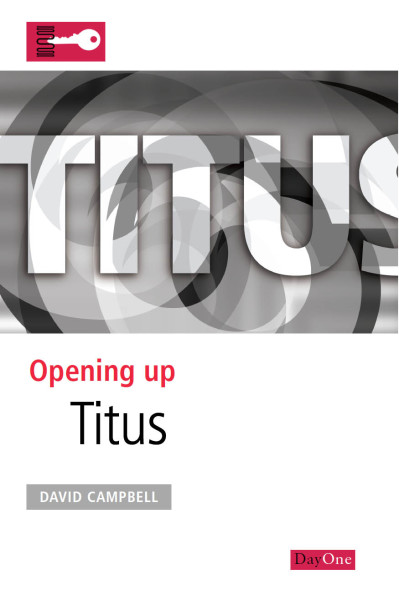
Think of today's church, and the issues that so often have to be faced: establishing a well-functioning eldership, combatting false teaching, upholding the importance of sound doctrine, how we are to live as Christian men and as Christian women, appreciating the grace of God in salvation, and looking forward to the coming again of our Lord Jesus. All these, and many other themes, are carefully and practically worked through in this helpful guide which opens up the message of Titus for us today.
Although the Bible can seem incomprehensible, the Opening Up the Bible series is designed to provide a basic grounding and introduction to the individual books within it. These simple (but not simplistic) tools will help individuals and small groups understand God’s Word, no matter what background or knowledge they already have.
Each volume takes you section-by-section through the covered book, opening up God's word with wisdom, insight, and practical application. Additionally, the "For Further Study" points at the end of a section provide guidance to other areas of scripture that further illuminate the lesson, and the "To Think About and Discuss" section provides thought-provoking questions that can be used by both individuals and groups to gain understanding and apply the subject matter to life today.
David Campbell was born and raised in Scotland and was converted to Christ as a child. During his bachelor’s degree at Glasgow University he felt a call to the gospel ministry and subsequently spent four years studying at the Free Church of Scotland College in Edinburgh. After being the pastor of the Geneva Road Evangelical Baptist Church in Darlington, England, he began his ministry in Grace Baptist Church, Carlisle, Pennsylvania. He and his wife, Mairi, have two daughters, Megan and Caitriona. David is also author of Day One’s Travel with John Knox.
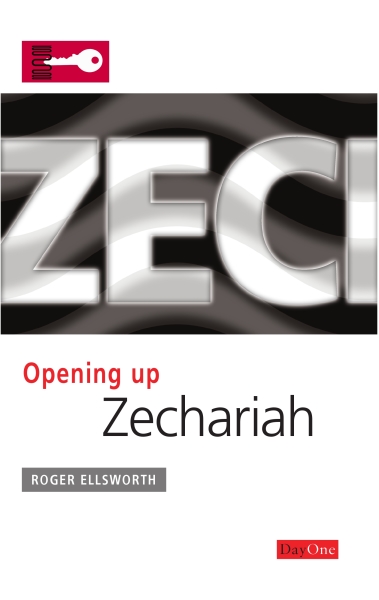
The Jewish people had been called by God to rebuild the temple in Jerusalem after their years of captivity in Babylon. After starting well, they laid the work aside. But then they heard a voice that emphasized the sufficiency of God for his people. That voice, belonging to Zechariah, was never more encouraging and stimulating than when it proclaimed the coming Christ and the glories awaiting those who trust him. Zechariah's prophecy still speaks today with power to those who are deeply discouraged and sorely distressed. Its message of Christ medicates every ill and lifts every heart.
Although the Bible can seem incomprehensible, the Opening Up the Bible series is designed to provide a basic grounding and introduction to the individual books within it. These simple (but not simplistic) tools will help individuals and small groups understand God’s Word, no matter what background or knowledge they already have.
Each volume takes you section-by-section through the covered book, opening up God's word with wisdom, insight, and practical application. Additionally, the "For Further Study" points at the end of a section provide guidance to other areas of scripture that further illuminate the lesson, and the "To Think About and Discuss" section provides thought-provoking questions that can be used by both individuals and groups to gain understanding and apply the subject matter to life today.
Having served for many years as a pastor, Roger Ellsworth is currently engaged in itinerant ministry. He is also the author of fifty books, many of which have been published by Day One. He and his wife, Sylvia, have two sons and five grand-children.

When did you last hear a sermon based on a passage from the prophecy of Zephaniah? This is one of the most neglected books in the whole Bible. It was delivered and written after many years of silence from God. The northern kingdom of Israel, or Ephraim, had already been deported by Assyria, never to return. The prophecy of Zephaniah was to be the last given before Judah, the southern kingdom, was taken away into Babylon for around seventy years of exile. Here is an easy-to-read treatment of the prophecy which draws clear lines of practical application from the situation then to our fast-paced modern life, especially showing how the prophecy points to the only hope of salvation from God's judgement: faith in the Lord Jesus Christ.
Although the Bible can seem incomprehensible, the Opening Up the Bible series is designed to provide a basic grounding and introduction to the individual books within it. These simple (but not simplistic) tools will help individuals and small groups understand God’s Word, no matter what background or knowledge they already have.
Each volume takes you section-by-section through the covered book, opening up God's word with wisdom, insight, and practical application. Additionally, the "For Further Study" points at the end of a section provide guidance to other areas of scripture that further illuminate the lesson, and the "To Think About and Discuss" section provides thought-provoking questions that can be used by both individuals and groups to gain understanding and apply the subject matter to life today.
Michael Bentley worked as a bookshop manager and served in the British army before his call to the ministry. He has a diverse background, which includes freelance religious reporting for national and religious radio and television, being a Religious Education teacher, and holding pastorates in Surrey, South East London, and Berkshire. He is also closely involved with his local community as a member of various committees and councils. His hobbies include singing second bass in the Bracknell Choral Society. Now retired, he still preaches regularly and has a ministry of writing, with some thirteen books in print including Opening Up Amos and Face2face: David. He lives in Bracknell with his wife, Jenny, and has five children and seven grandchildren.

This verse-by-verse commentary on the Pastoral Epistles (1 & 2 Timothy and Titus) thoroughly engages the Greek text with care for the linguistic nuances and theological interpretation. George W. Knight III presents his research and critical analysis in a complete, satisfying manner. His excellent exegesis raises the standard by which future volumes of the New International Greek Testament Commentary are written.

The Apostle Paul was bound by prison chains when he wrote to the church at Philippi. Despite his loss of liberty, and opposition from fellow-workers, the letter radiates joy - joy that Christ was proclaimed, joy in fellowship with the Philippian Christians, and above all joy in Jesus himself. In Message of Philippians, Alec Motyer explores Paul's great themes, so relevant today: Christian unity; the Person of Jesus and what he has achieved for us; the call to live a life worthy of the gospel.
About the Bible Speaks Today (BST) Series:
Edited by J.A. Motyer and the late John R. W. Stott, the Bible Speaks Today commentaries are characterized by what Stott called a "threefold ideal . . . to expound the biblical text with accuracy, to relate it to contemporary life and to be readable." As such, each contributor in this series is both a noted scholar and a working pastor.
The BST series, now complete, covers all sixty-six books of the bible (Old and New Testaments) in fifty-five volumes. If you preach or teach from Scripture, the Bible Speaks Today series will help you apply the timeless biblical message to the everyday experiences of your listeners. And if you study the Bible on your own, these volumes will be a helpful resource focusing on the significance of God's Word for your own life and work.
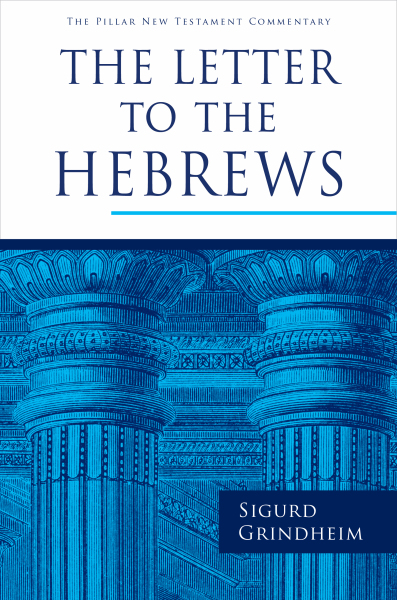
What does the Letter to the Hebrews have to say to Christians today?
A compelling exhortation to hold true to the faith in the face of adversity. A sermon rife with iconic imagery and Old Testament allusions. A signal work of theology in the New Testament.
Above all, the Letter to the Hebrews proclaims the high priesthood of Jesus Christ. But the book’s textual complexity and long history of interpretation can be overwhelming. In this new Pillar commentary, Sigurd Grindheim illuminates the Letter to the Hebrews, paying careful attention to linguistic features and historical context—all while centering its relevance to modern readers.
Grindheim clearly and comprehensively addresses major issues about the text, including authorship, date, canonicity, formal qualities, and major themes. Following his thorough introduction, he explains each line of the text and its significance for believers today. Grindheim’s commentary offers pastors, students, and scholars the clarity and fresh insights they want in their scriptural study.
Sigurd Grindheim is a professor in the Department of Pedagogy, Religion, and Social Studies at Western Norway University of Applied Sciences.

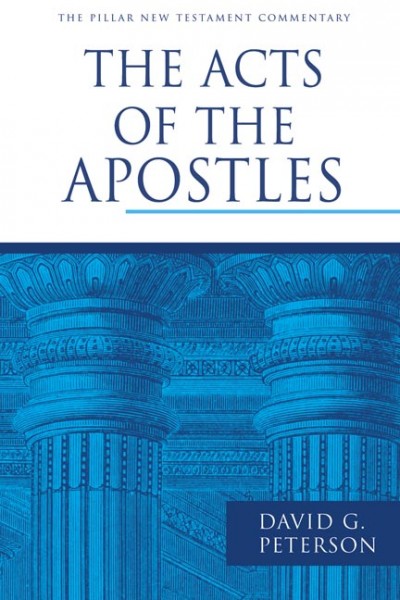
In view of how long the book of Acts is — over a thousand verses — Peterson’s commentary is admirably economical yet meaty. His judgments, according to Don Carson, are always "sane, evenhanded, and judicious." Even while unpacking exegetical details, Peterson constantly scans the horizon, keeping the larger picture in mind. With its solid exegesis, astute theological analysis, and practical contemporary application, Peterson's Acts of the Apostles is a commentary that preachers, teachers, and students everywhere will want and need.

Leon Morris tackles the complexities of faith and interpretation associated with the Epistle to the Romans in this substantial yet easy-to-read commentary, written to be intelligible to the layperson while also taking account of modern scholarship.
Morris writes for readers who use commentaries to discover further what the Bible means. This mature, evangelically oriented commentary will continue to meet the needs of students, pastor, and general readers alike.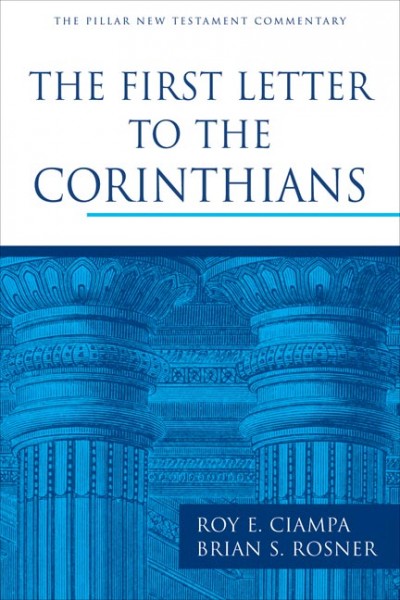
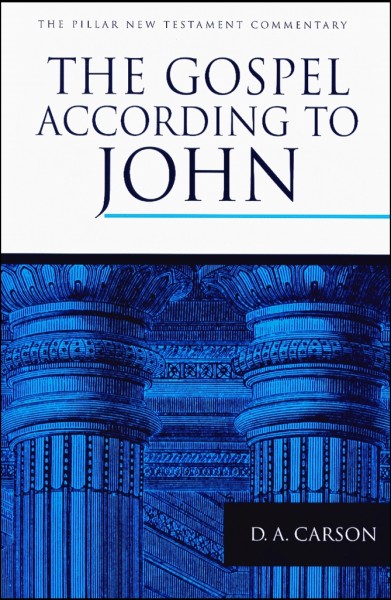
This commentary seeks above all to explain the text of John's Gospel to those whose privilege and responsibility it is to minister the Word of God to others, to preach and to lead Bible studies. D.A. Carson has tried to include the kind of information ministers need to know, but to do so in such a way that the informed layperson could also use the work in personal study of the Bible, exclusively for purposes of personal growth in edification and understanding.

Although Luke is often thought to have a primarily Gentile focus, Edwards counterbalances that perspective by citing numerous evidences of Luke’s overarching interest in depicting Jesus as the fulfillment of God’s providential work in the history of Israel, and he even considers the possibility that Luke himself was a Jew. In several excursuses Edwards discusses particular topics, including Luke’s infancy narratives, the mission of Jesus as the way of salvation, and Luke’s depiction of the universal scope of the gospel.
While fully conversant with all the latest scholarship, Edwards writes in a lively, fluent style that will commend this commentary to ministers, students, scholars, and many other serious Bible readers.
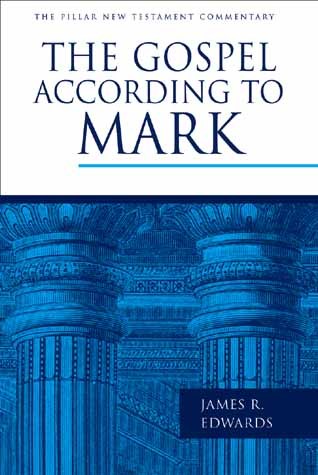
Written by a biblical scholar who has devoted thirty years to the study of the second Gospel, this commentary aims primarily to interpret the Gospel of Mark according to its theological intentions and purposes, especially as they relate to the life and ministry of Jesus and the call to faith and discipleship. Unique features of James Edwards's approach include clear descriptions of key terms used by Mark and revealing discussion of the Gospel's literary features, including Mark's use of the "sandwich" technique and of imagistic motifs and irony. Edwards also proposes a new paradigm for interpreting the difficult "Little Apocalypse" of chapter 13, and he argues for a new understanding of Mark's controversial ending.
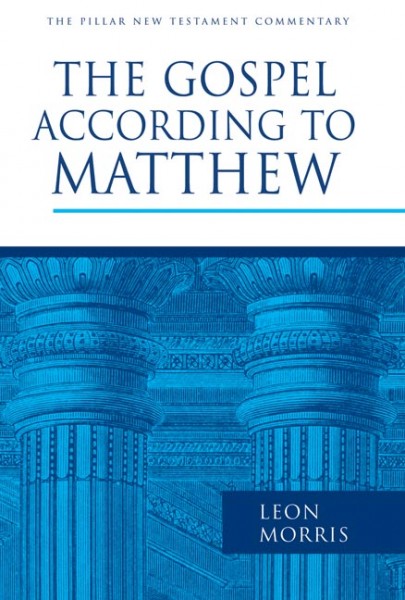
This superb commentary in the Pillar series explores the meaning and relevance of Matthew in an eminently straightforward fashion. Leon Morris writes for readers who use commentaries to discover further what the Bible means. Throughout, he makes clear what he considers to be the meaning of the Greek text that Matthew has bequeathed to the church. A perceptive introduction precedes Morris’s warmhearted verse-by-verse exposition of Matthew, an exposition based on his own literal translation of the text. Now a standard reference work on the Gospel of Matthew, this mature, evangelically oriented commentary will continue to meet the needs of students, pastor, and general readers alike.
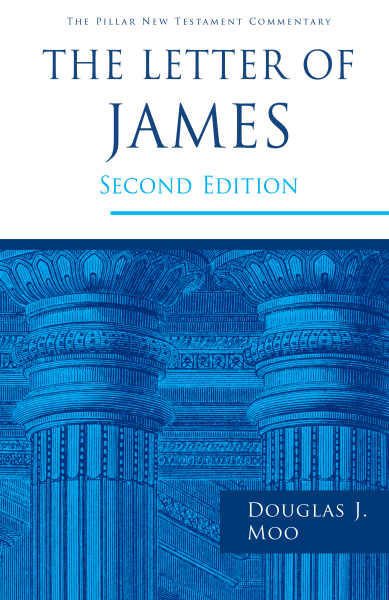
Few New Testament books have been as controversial and misunderstood as the letter of James. Its place in the canon was contested by some early Christians, and the reformer Martin Luther called it an “epistle of straw.” The sometimes negative view of the letter among modern theologians, however, is not shared by ordinary believers. Well known and often quoted, James is concise, intensely practical, and filled with memorable metaphors and illustrations. As such, it has become one of the most popular New Testament books in the church.
This highly original commentary on James by respected New Testament scholar Douglas Moo combines penetrating scholarship with the simplicity of style and pastoral tone characteristic of James itself. After discussing such background issues as authorship, genre, purpose, structure, and theology, Moo provides a verse-by-verse exposition of the text that leads readers to the heart of James’s message—wholehearted commitment to Christ. In addition to expounding the meaning of James, Moo also takes care to provide practical insights for applying that meaning in the church today.
At once scholarly and accessible, this volume has become a standard commentary on James. The second edition is based upon the newest version of the NIV and incorporates the latest scholarship. It has been expanded, updated, and revised throughout.The Pillar New Testament Commentary, designed for serious readers of the Bible, seeks above all to make clear the meaning of the text of Scripture as we have it. Writers of the PNTC volumes interact with the most important, informed contemporary debate yet avoid undue technical detail. Their ideal is a blend of rigorous exegesis and exposition, scholarship and pastoral sensitivity, with an eye alert both to biblical theology and to the contemporary relevance of the Bible.
Reviews
“There is much to be gained from this commentary, both exegetical and practical, by pastors and serious students.” — Southwestern Journal of Theology
“Moo has many insights into the challenges James presents to the Church of his time and of today. James’s contention, that Christians must not only reflect theologically about life but also live a holy and obedient lifestyle, is a timely word which ought to be heard and heeded, especially in the western Church of this new millennium. . . . This re-evaluation of James is much to be commended.” — Methodist Recorder
“The commentary is most valuable for its excellent exegesis, which is not so technical that the non-scholar would find it tedious. Homiletical and devotional insights, which pervade the work, also make the volume a worthwhile addition to the Bible student's library.” — Interpretation
“Douglas Moo is well known to New Testament commentary readers, both from his magisterial volume on Romans in The New International Commentary on the New Testament and from his excellent little work on James in the Tyndale series. Fully abreast of the latest scholarship on James, Moo here walks readers with remarkable clarity through even complex exegetical issues. He consistently comes to convincing conclusions. As a bonus, he occasionally inserts comments by way of application that reflect his warm pastoral heart. Highly recommended.” — Craig L. Blomberg Denver Seminary
“This commentary offers something for everyone: it is simple enough for every Christian believer to benefit from yet profound enough to challenge scholars in their presuppositions and interpretations.” — Dean B. Deppe, author of All Roads Lead to the Text: Eight Methods of Inquiry into the Bible
“Sure to stimulate readers’ interest in the ‘quest of the historical James,’ Moo’s volume provides illuminating commentary on this important New Testament book. Rich word studies and up-to-date background material—especially drawn from the Jewish Wisdom tradition—make this a notable addition to the current literature. Particularly valuable are sections on ‘faith and works’ and the vexed topic of ‘prayer, faith, and healing.’ Moo writes clearly and succinctly, and his understanding the theme of James to be ‘spiritual wholeness’ adds an extra dimen¬sion to his academic approach. Whether in the classroom or in the pastor’s study, this commentary will be much welcomed and valued.” — Ralph P. Martin, author of the Interpretation commentary on Ephesians, Colossians, and Philemon
Douglas J. Moo is the Kenneth T. Wessner Professor of New Testament at Wheaton Graduate School. His other commentaries include the NICNT volume on Romans and the PNTC volume on Colossians and Philemon.
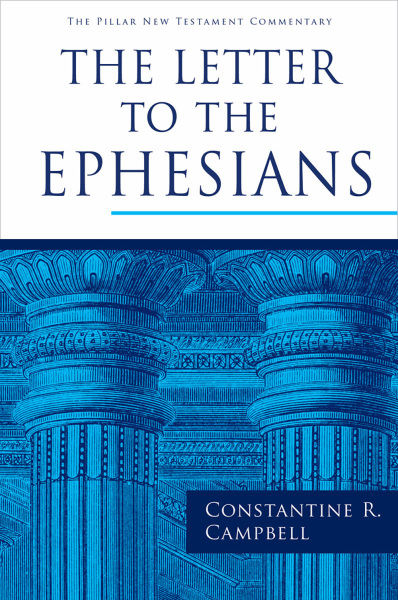
A clear and comprehensive commentary on Paul’s Letter to the Ephesians.
In the latest Pillar New Testament Commentary, Constantine R. Campbell illuminates the Letter to the Ephesians with scholarly precision and pastoral warmth. In line with the christological concerns of the letter, Campbell calls special attention to its theme of union with Christ. His thorough analysis covers a breadth of topics, including salvation and grace, the glory of God, and the church and its mission.
Aimed at students and scholars of the Pauline epistles, Campbell’s commentary carefully explains each verse of Ephesians with attention to historical and linguistic context. Yet the commentary prioritizes imminent theological concerns and remains accessible to any serious reader of the New Testament.
Designed for serious readers of the Bible, The Pillar New Testament Commentary seeks above all to make clear the meaning of the text of Scripture as we have it. Writers of the PNTC volumes interact with the most important, informed contemporary debate yet avoid undue technical detail. Their ideal is a blend of rigorous exegesis and exposition, scholarship and pastoral sensitivity, with an eye alert both to biblical theology and to the contemporary relevance of the Bible.
Constantine R. Campbell is associate research director at the Sydney College of Divinity. He is ordained deacon in the Anglican Church of Australia. His numerous books include Paul and Union with Christ and Paul and the Hope of Glory.

After a select bibliography, Hansen's introduction sets forth the historical setting of the church in Philippi, the nature and occasion of the letter, and a preview of two key themes—the gospel of Christ and the community in Christ. The commentary itself discusses Philippians in light of these themes, considering Paul's greetings, reports of gospel ministry, imperatives for citizens worthy of the gospel, recommendations of two Christ-like servants, and disclosures of his personal experience. Hansen's treatment as a whole is distinctive for the way it draws out and highlights the themes of partnership, citizenship, and friendship in Paul's Philippian letter.
"With themes and emotions so varied, the letter to the Philippians needs a commentator with a sure grasp and a warm heart. . . . Hansen writes with admirable clarity and simplicity, even when he is unpacking notoriously complex matters."
— D. A. Carson (from the preface)


This updated and revised Pillar commentary seeks to clearly explain the meaning of the letters of John to teachers, pastors, and general readers looking for a reliable and trusted resource for personal study. Colin Kruse introduces the important issues involved in interpreting the Johannine letters, gives verse-by-verse comments, and provides extensive discussion of major theological themes, including the real humanity of Christ, atonement, the role of the Spirit, Christian assurance, koinōnia, Christian love, and eternal life.
The Pillar New Testament Commentary, designed for serious readers of the Bible, seeks above all to make clear the meaning of the text of Scripture as we have it. Writers of the PNTC volumes interact with the most important, informed contemporary debate yet avoid undue technical detail. Their ideal is a blend of rigorous exegesis and exposition, scholarship and pastoral sensitivity, with an eye alert both to biblical theology and to the contemporary relevance of the Bible.
Reviews
“Serious students of the Johannine literature will find in this book a reliable and trustworthy guide to John’s letters. Kruse brilliantly reconstructs the context of the struggles that John’s church faced, and he successfully expounds the apostle’s defense of orthodox belief in what must have been a tumultuous and difficult era. Many generations will find themselves in Kruse’s debt for his outstanding contribution.” — Gary M. Burge, Calvin Theological Seminary
“A splendid achievement and a welcome addition to the excellent Pillar series. The numerous notes on Johannine themes and the helpful attention to the relevant patristic sources are notable features. Comprehensive, thorough, and judicious, Kruse’s work promises to be a standard for many years.” — Paul Barnett, former bishop of North Sydney, Australia
Colin G. Kruse is senior lecturer in New Testament at Melbourne School of Theology, Australia. His other books include the Pillar New Testament Commentary on Romans and Tyndale New Testament Commentary volumes on John and 2 Corinthians.

An erudite and evangelical guide to Paul’s letters to the Colossians and to Philemon.
With brilliant exegesis and sound practical insight, noted commentator Douglas J. Moo explicates the Letters to the Colossians and to Philemon, with an eye toward their application for readers today. Moo bases his commentary on the Greek text of the letters, while accessibly explaining the English text to his contemporary audience.
Freshly revised and updated, this second edition remains methodologically sound, authentically evangelical, and pastoral in approach. This invaluable volume of the Pillar New Testament Commentary series offers biblical insights to a wide range of readers, from teachers and students to pastors and parishioners.
Praise
"In his updated and revised Colossians and Philemon, Doug Moo has provided an ongoing gift to the church. With his typical clarity and cogency, he ably navigates the many historical questions of both letters. His judicious exegesis and theological reflections offer readers nuanced discussions of these letters in their original contexts, with thoughtful contextualization for the church today." — Jeannine Brown, David Price Professor of Biblical and Theological Foundations, Bethel Seminary
Douglas J. Moo is professor emeritus of biblical studies at Wheaton College. His other commentaries include the New International Commentary on the New Testament volume on Romans and the Pillar New Testament Commentary volume on James.
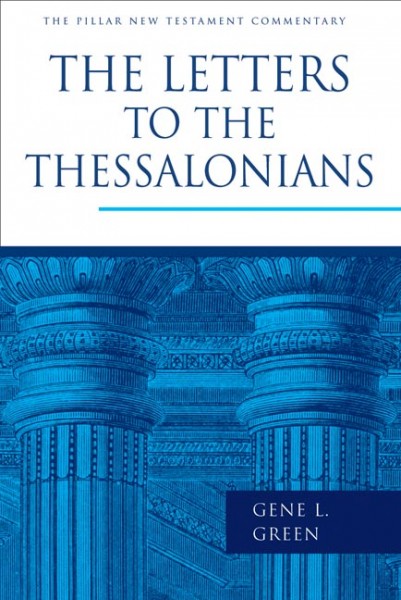
The book begins with an in-depth study of the Thessalonians themselves — their history, land, socioeconomic conditions, and religious environment. This fascinating discussion gives the necessary context for fully appreciating the circumstances surrounding the founding of the city's first church and the subsequent struggles of the Thessalonian believers to live out their Christian faith.
The main body of the book provides informed verse-by-verse commentary on 1 & 2 Thessalonians that extracts the fullest possible meaning from these important New Testament texts. As Green's exposition shows, the Thessalonian scriptures are especially valuable as letters of friendship and for showing Paul's pastoral concern for the many areas in which the Thessalonians needed guidance. Some of Paul's purposes are to thank the new believers for their steadfastness amid suffering, to encourage them in their trials, to urge them not to neglect their daily work, and, no less important, to teach them about the future of believers who die before Christ returns. Indeed, the matter of the last things and the second coming of Christ so permeates these texts that they are often called Paul's eschatological letters.
Filled with new information about ancient society, this commentary will fast become a standard reference work for Bible study. By carefully bridging the biblical and modern worlds, Green shows with clarity and warmth the continuing relevance of 1 & 2 Thessalonians for contemporary readers.
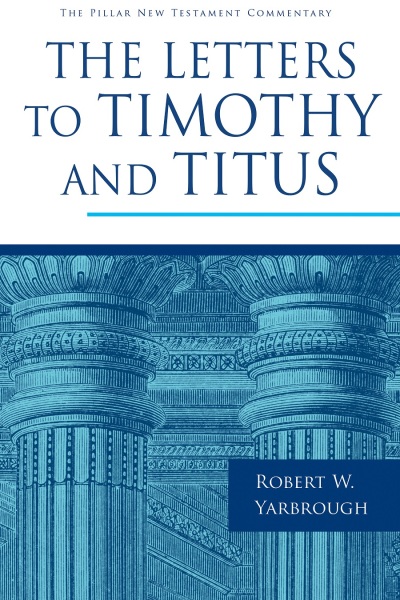
The Pastoral Letters—1 Timothy, 2 Timothy, and Titus—have made an enduring contribution to understanding the role of pastors in the church. With a spirited devotion to the text, Robert Yarbrough helps unlock the meaning of these short but rich letters in this commentary.
In keeping with the character of Pillar New Testament Commentary volumes, The Letters to Timothy and Titus offers a straightforward reading of these texts. Their primary concerns—God, salvation, and the pastoral task—remain central to Yarbrough’s thorough and comprehensive exegesis. Engaging with the best scholarship and resources, Yarbrough shows how these letters are as relevant today as they were to the early Christians.
The Pillar New Testament Commentary, designed for serious readers of the Bible, seeks above all to make clear the meaning of the text of Scripture as we have it. Writers of the PNTC volumes interact with the most important, informed contemporary debate yet avoid undue technical detail. Their ideal is a blend of rigorous exegesis and exposition, scholarship and pastoral sensitivity, with an eye alert both to biblical theology and to the contemporary relevance of the Bible.
While Today's New International Version is generally the translation of choice for the English text, Pillar authors base their exposition on the Greek New Testament. They are deeply committed to a fresh wrestling with the biblical text, using every means at their disposal to "loosen the Bible from its pages" to help readers understand what the text says and how to apply it to life today.
Reviews
"Yarbrough's commentary matches the goal of the Pillar series. He writes with clear theological interest and directs his comments to practical, pastoral issues — as the Pastoral Letters themselves do. Those who have followed this series undoubtedly will find this work a useful addition." — Mark A. Seifrid, Concordia Seminary.Robert W. Yarbrough is professor of New Testament at Covenant Theological Seminary in St. Louis, coeditor of the Baker Exegetical New Testament Commentary series, and coauthor of the widely used textbook Encountering the New Testament.
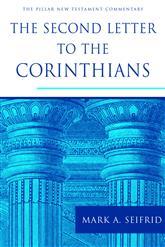
The question that Paul set before the ancient church in Corinth -- Do you not recognize that Jesus Christ is in and among you? (2 Cor 13:5) -- remains a critical question for the church today. This commentary by Mark Seifrid seeks to hear Paul’s message afresh and communicate it to our time.
Seifrid offers a unified reading of 2 Corinthians, which has often been regarded as a composite of excerpts and fragments. He argues that Paul’s message is directed at the “practical atheism” of the Corinthian church -- the hidden heresy that assumes God’s saving work in the world may be measured by outward standards of success and achievement.
Like all of the Pillar volumes, Seifrid’s commentary on 2 Corinthians offers careful grammatical analysis and exegesis with clear pastoral application.
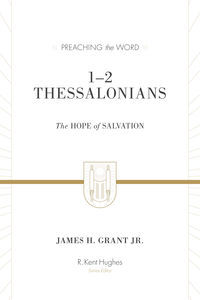
Paul wrote to the church in Thessalonica to encourage them to live in the light of the gospel. In his two letters he addresses a number of topics, including the persecution they were enduring, the second coming of Christ, and how they were to live in the present times. While the letters were written nearly two thousand years ago, pastor James H. Grant Jr. insists that Paul’s audience includes us as well as the Thessalonians.
Grant applies Paul’s message to contemporary churches by moving expositionally through 1 & 2 Thessalonians. Twenty-five sermons examine each passage of the books as the gospel and its implications are unpacked in light of Christ’s second coming.
1 & 2 Thessalonians is a Preaching the Word commentary. The series is noted for its unqualified commitment to biblical authority, clear exposition of Scripture, readability, and practical application. It is an ideal resource for pastors and teachers, as well as for personal Bible study.

The issues addressed in the the book of 1 Corinthians are strikingly similar to the issues faced by the Church today: sin, pride, disunity, and confused identities. Paul warns the Corinthians with words of exhortation, but not without profound encouragement. In doing so, he points modern readers to the hope offered to Christians as they follow Jesus in a fallen world.
In this commentary, pastor Stephen Um uses powerful illustrations and practical applications to point readers and teachers of the Bible to the heart of Paul’s first letter to the Corinthians: the gospel of Jesus Christ that has the power to save, change, and unite God’s people.
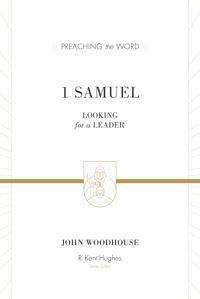
What kind of leaders should we follow? What kind of leaders should we be? And what does God have to do with it? These are some of the questions inherent in 1 Samuel, with its portrait of divine response to ancient Israel's leadership crisis. That crisis was met through three men-Samuel, Saul, and David-in ways that forever changed the character of Israel's leadership and clarified what God requires of his people and their leaders.
As John Woodhouse demonstrates, 1 Samuel's biblical context provides serious reflection on our need for leadership and the failure of human leaders. But it also reveals God's answer for Israel, which turns out to be his answer for the whole world and for each of us individually. This perceptive commentary not only illumines Old Testament history but brilliantly points to the New Testament promise that was fulfilled in Jesus, our sovereign leader and Savior. Part of the Preaching the Word series.

Neither Peter nor Jude minced words about the realities that would confront every Christian and that were confronting the church at large-suffering and persecution, contradictory views of the gospel, constant challenges to the faith at the hands of false teachers. Yet even in the face of these harsh realities, both biblical writers unswervingly declared that there is no cause for despair as long as one's foundation and identity are in Christ.
With the truths of 1-2 Peter and Jude echoing across the ages, commentator David Helm beckons us to listen in his stirring exposition. Yet it is not enough to listen, he says. Peter's and Jude's words must compel us to do just what the early Christians did: hold fast to their identity in Christ, ground themselves in the truth, live lives worthy of their calling, and vigorously contend for the faith. Part of the Preaching the Word series.
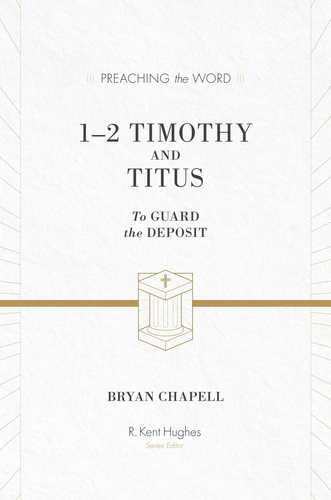
There are substantial reasons to be energized about studying the Pastoral Letters of Paul. Between them they teach the proper ordering of the church (1 Timothy), they present a developed challenge to all Christians (2 Timothy), and they suggest God’s priorities for mature ministry (Titus). Experienced pastors R. Kent Hughes and Bryan Chapell have done their homework—applying sound principles in interpreting the texts so that we can understand what Paul was really saying.
Teaching on important matters for the local church, Hughes and Chapell offer a timely word to the many Christians who are concerned about their role and responsibility to communicate the truth of the gospel in this diverse and pluralistic society. The Pastoral Letters remind us that, like Timothy, we are to guard what has been entrusted to our care, to fight the good fight, and to keep preaching the Word.
Through the apostle's words and the commentators' insights here, we gain an understanding of what God requires of those who would lead in the local church, as well as of those who would be led. Embracing grace, loving godliness, and sharing Christ were not just charges to the early believers, and are not solely the responsibility of pastors, deacons, and elders in the church. They are exhortations for any of us who call ourselves disciples of Christ today.
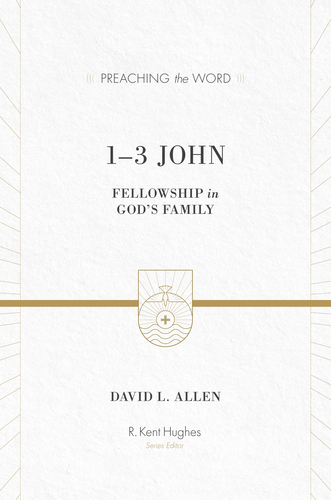
This commentary on 1–3 John is a great resource for pastors and laypersons alike, showing how John’s letters lay out the foundational nature of truth and love in the context of the local church, with teachings that overflow with theological depth and real-world wisdom. Part of the Preaching the Word commentary series.
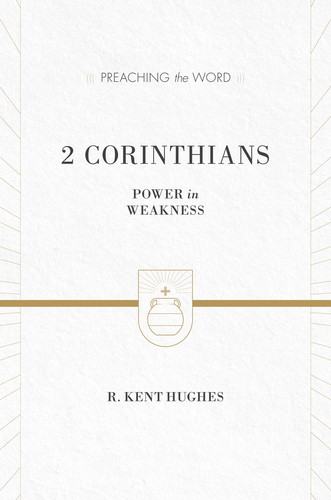
During Paul’s ministry, Corinth was a newly rebuilt, bustling, important city in the Roman Empire. It was a place full of pride, individualism, wealth, and religious pluralism. No wonder its inhabitants held little regard for Paul’s message!
Sound familiar? Our contemporary culture has much in common with ancient Corinth. The relevance of this book to churches today is astounding. Paul delivers powerful theology that turns the values of the ancient Roman world upside-down—the grace of God, the centrality of the cross, and God’s power made perfect in weakness. He challenges us to live counterculturally.
In this commentary on 2 Corinthians, Pastor R. Kent Hughes carefully examines this second letter from the apostle Paul to the church in Corinth, continuing to provide rich biblical insight for the body of Christ.






- Adapt your commentary collection month-to-month based on the book or books you are studying.
- Build your commentary library strategically without hundreds of dollars of upfront investment.
- Never get stuck with commentaries you rarely use - swap them out each month as your needs change.



